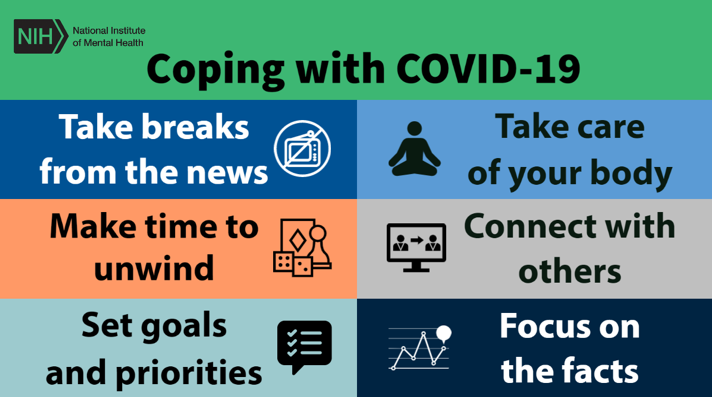Taking Care of Your Mental Health During COVID-19
Tips & Resources for PCS Students
November 3, 2020
As we all try to navigate this new normal, mental health has become a forefront issue for students across the world. Increased screen time, distance learning, and lack of social engagements can make maintaining mental health very difficult. Because of this, it is so important to establish healthy self care practices to stay grounded, resilient, and motivated. I have researched and compiled a list of tips and tools for PCS students to help improve mental health.
Tips for improving mental health:
- Learning about COVID-19 – The CDC recommends that teens learn about COVID-19 in order to decrease anxiety about the disease. To learn about COVID-19, click here.
- Exercise – Regular exercise is scientifically linked with improved mental health, and is especially important during the pandemic. To access a collection of free exercise and stretching videos for all fitness levels, click here.
- Meditation – Meditation is a practice that can help both in the moment and long term. For some free meditation videos, click here.
- Sleep – Now more than ever, experts are emphasizing the importance of adequate sleep in order to maintain optimum mental health. On average, teenagers need 9 hours and 15 minutes of sleep each night, although it depends on the person. Click here for an article providing tips to improve sleep.
- Outside Time – Many experts recommend going outside in the fresh air at least once per day. Click here for a list of local hiking trails.
- Social Connection – Staying connected with family and friends is important for maintaining mental wellness. Here are a few online resources to help stay connected remotely.
- Screen breaks – Especially since everyone need to be on a screen so much these days, it is recommended that students take periodic screen breaks throughout the day, and limit unnecessary screen time.
- Healthy diet and hydration – Experts suggest maintaining a healthy diet and drinking enough water to help with overall health, including mental health. It is a good idea to have a waterbottle with you throughout the day.
- Self care practices – Maintaining regular self care practices helps you to stay sane, and adds some fun and relaxation to help combat stress. This looks different for everyone. All of the ideas above are types of self care. Self care can be relaxation, hobbies, anything you find fun or relaxing. Some ideas are hobbies such as reading, making art or playing sports, or else relaxing by having a cup of tea, spending time with family, or listening to music.
I talked with Kristin Rivers, the Student Support Specialist at PCS, about her mental health recommendations for students during the pandemic. The main thing that Ms. Rivers tells students is to “learn to be okay with good enough this year.” This means learning to be okay with just getting through life right now, even if it means life looks a little different in whatever way, and you aren’t necessarily doing all of the things you normally would. Making time for mental health is one of the most important things, and most people will need more mental health breaks during the pandemic than usual, because of all of the stress that it brings. Ms. Rivers recommend prioritizing self care and spending time with family, and encourages students to take days off for their mental health when needed. She wants to remind students that making their mental wellness a priority will also help their academic success, as it increases focus and motivation. Lastly, Ms. Rivers says that planning technology free days and having safe social interactions will help mental wellness.
Here are some resources available to PCS students:
- PCS Virtual Student Support on Canvas
- This is a Canvas class that PCS students are enrolled in, your “online hub for the support services, advising, and social-emotional care you have come to rely on from our incredible team.”
- PCS Social and Emotional Learning
- This is the page on Social and Emotional Learning from the PCS website. It has resources and information on PCS services.
- Digital NEST Watsonville Work Sessions
- Digital NEST is offering a workspace for students to get homework or projects done, with wifi. Follow the directions on the link to sign up for a slot.
- NAMI Santa Cruz County
- The National Alliance on Mental Illness Santa Cruz County branch has many resources for students and families, including (but not limited to) support groups, ciris lines, counseling, disaster recovery, COVID-19 resources, classes, and a newsletter. Click the link to access these resources.
- Rivers, Ms. Moyer, Ms. De Sousa
- All of these PCS staff members have backgrounds in mental health, and all are available for student 1:1 mental health services.


